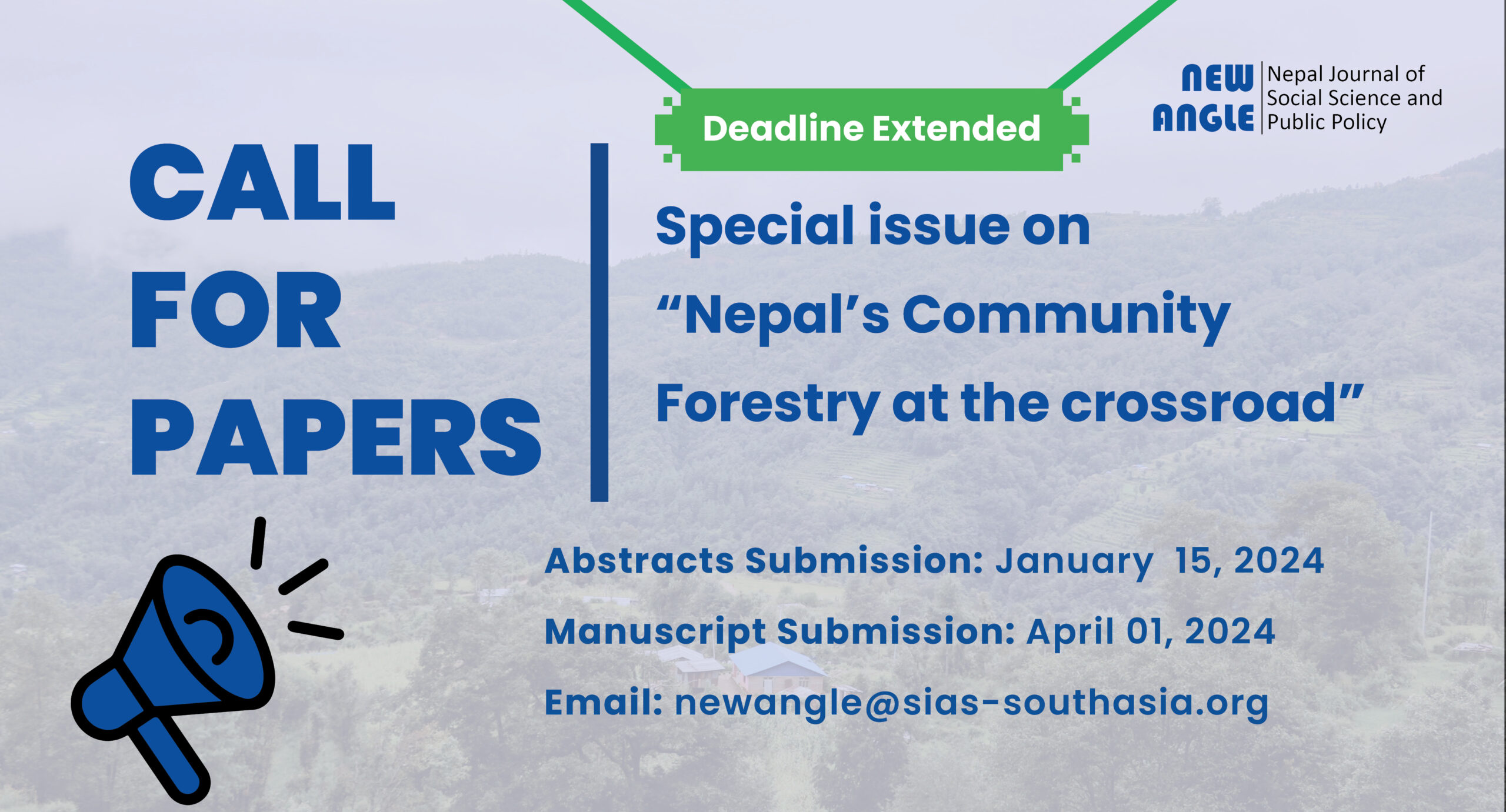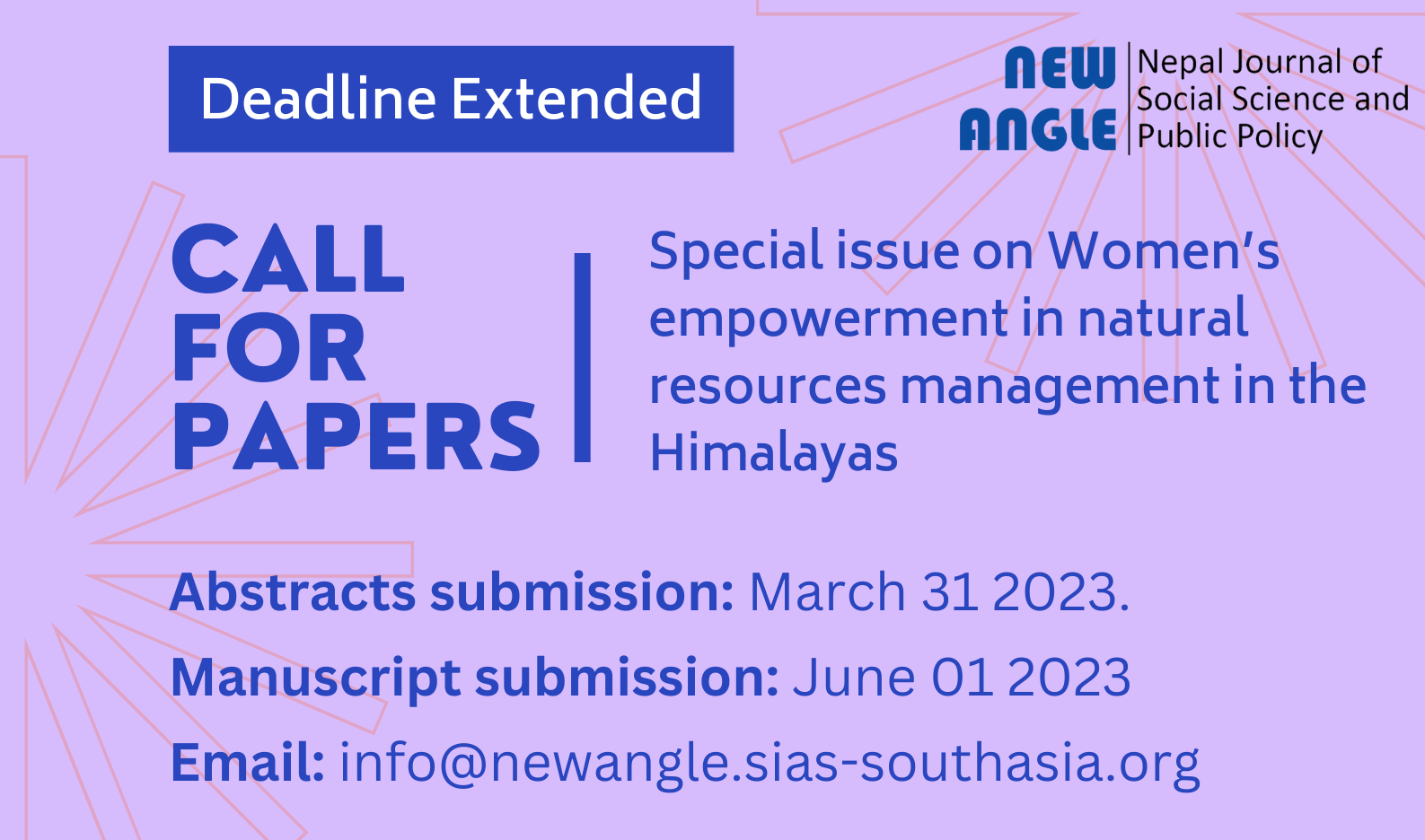Call for papers
New Angle: Nepal Journal of Social Science and Public Policy
Special Issue on
Understanding the Changing Livelihoods, Vulnerability and COVID-19 Pandemic
The last few decades have witnessed changes in the livelihoods of the people that has manifested in the form of transition from traditional to commercial agriculture and growing off-farm employment activities such as (foreign labor) migration, small business, wage laboring etc. This change in livelihood has been catalysed by socio-economic and political change, particularly through market expansion, access to basic infrastructures such as road, electricity, information and communication technologies and improvement in education.
However, both farm and non-farm-based sources of livelihoods are ridden with multiple challenges. On the one hand, there is a wide range of factors such as the size of land, shortage of labor, water, and damage of crops by wild animals that is making farming challenging and is pushing people towards exploring new sources of livelihood. On the other hand, globalisation has opened up opportunities for people to join the international labour market, though in precarious working conditions.
COVID-19 and associated disease control measures have brought unprecedented disruptions to the lives of people around the world. In the Himalayan region, where the population is already vulnerable to the shocks related to climate change, strict lockdown imposed to control the spread of COVID-19 disease caused loss of income due to diminished income-generating opportunities, and disruption in the social services, broken supply chain, and more. The shock of COVID-19 experienced in tandem with other existing stressors exacerbated the pre-existing vulnerabilities of the people in the region. While there is a broad understanding that COVID-19 has deepened social, political, and economic inequities on multiple fronts, much is yet to be understood about the longer-term impacts of the pandemic in the Himalayan region. Therefore, it is pertinent to ask how COVID-19 impacts livelihoods vulnerability in the Himalayan region.
This special issue of New Angle – Understanding the Changing Livelihoods, Vulnerability and COVID-19 Pandemic focuses on building and further deepening the understanding of the short-term and long-term impacts of the COVID-19 pandemic on livelihoods and the responses adopted at the local level to cope with the crisis. To that end, we invite papers including but not limited to the following themes.
- Changing dynamics of livelihood strategies and practices
- Understanding the livelihood vulnerability
- Impacts of COVID-19 on the livelihoods
- Policy and institutional aspects of COVID-19 containment
- People’s responses to COVID-19 related situations
- Changing dynamics of migration and remittance in the face of COVID-19
- Local responses to the COVID-19 pandemic and lessons
- Local innovations for adaptation in the new normal
Deadline for submission: Send your abstract (250-300 words) of the manuscript by August 31st, 2021 and full paper by December 31st, 2021 to the following email address: gyanu@sias-southasia.org or maskeygyanu@gmail.com
GENERAL GUIDELINES
What kind of articles do we encourage?
We accept two broad types of articles, i.e., research papers and opinion pieces. The research papers can include articles that are based on rich empirical data, preferably collected fresh from the field. However, rigorous analysis of secondary/historical sources will also be accepted. Shorter opinion pieces can also be considered, especially from established and experienced professionals. However, we will avoid entirely speculative or theoretical articles. All articles need to be guided by a well-formulated purpose and clearly defined research questions (or hypotheses).
The journal manuscripts lie in the intermediate ground between journalism and academic fieldwork, and as such, will stimulate public debate through disseminating research findings in an easily accessible format.
Format of submission:
Articles must subscribe to the following format:
- Research articles should be roughly 8500 words (excluding the references) and include an abstract of 250-300 words.
- Opinion pieces can be between 2000-3000 words with a summary of 100 to 150 words [key message].
- Spelling should be in the UK English.
- Articles should be in an MS Word compatible format, with a font size of 12, and 1.5 line spacing.
- Short quotations should use single quotation marks, while longer quotes should be indented.
- Photographs can be included, but should be no more than 4×6 inches, and will be published in black and white.
Reference style:
Referencing should be in the Harvard style for example:
Journal Article
Gill, P., 2009. The politics of land reform in Nepal 1951–1964. Studies in Nepali History and Society, 14(2), pp.217–59.
Book
Regmi, M.C., 1976. Land ownership in Nepal. Berkeley: California University Press.
Edited Book
Keene, E. ed., 1988. Natural language. Cambridge: University of Cambridge Press. Silverman, D.F. and Propp, K.K. eds., 1990. The active interview. Beverly Hills, CA: Sage.
Chapter of Edited book
Smith, J., 1975. A source of information. In: W. Jones, ed. 2000. One hundred and one ways to find information about health. Oxford: Oxford University Press. Ch.2.
E-Book
Carlsen, J. and Charters, S., eds. 2007. Global wine tourism. [e-book] Wallingford: CABI Pub. Available through: Anglia Ruskin University Library website <www.libweb.anglia.ac.uk> [Accessed 9 June 2008].
News Paper Article
Kattal, S. C., 2008. Land reform in election manifestos. Kantipur Daily, 3 Sep. p.4.
Statutory Documents
GON, 1990. Interim Constitution of Nepal-2007. Kathmandu: Government of Nepal.
Proceeding
RRN and CECI-Nepal, 2007. Development strategies for a new Nepal: a national debate. Kathmandu, Nepal, 21-22 December 2006. Kathmandu: Rural Reconstruction Nepal and Centre for International Studies and Cooperation-Nepal.
Conference Paper
Brown, J., 2005. Evaluating surveys of transparent governance. In: UNDESA (United Nations Department of Economic and Social Affairs), 6th Global forum on reinventing government: towards participatory and transparent governance. Seoul, Republic of Korea 24-27 May 2005. New York: United Nations.




